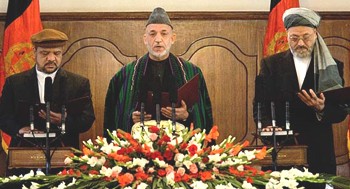Jerome Starkey in Shinwar
“People hate the Americans from the bottom of their hearts,” Haji Akhtar Mohammed Shinwari said as he recalled how the US military had brought death to his homeland.
For residents of Shinwar, a village in distant Nangahar province, the message from President Karzai’s address yesterday that the Americans would hand over security over the next five years was disappointing.
At the village bazaar, Mr Shinwari told The Times that he could not wait that long. In 2007, a unit of special forces was speeding along a busy road a few miles from his village when they opened fire, killing 19 people and wounding 50. The unit responsible was sent home and the local US commander described the incident as a “stain on our honour”. He paid out almost $40,000 (£25,000) in compensation.
But trust, in Afghanistan’s conservative Pashtun belt, is hard won and easily forfeited. In the 20 months since the attack house raids by Nato troops had continued, Mr Shinwari, 44, said. More civilians had been killed, while little had been done to help ordinary people. “People don’t like their operations,” he said. “They search houses without permission, detain people without trial.”
In the neighbouring village of Rakhzi, Niaz Amin, a 20-year-old student, lost his older brother and grandfather in American operations last year. “We still don’t know why they did it,” he said. “When they came into the house I tried to speak to them in English but they shouted, ‘Don’t speak’.
“The first time they came my brother ran out and he was wounded by an airstrike. They took him to the hospital but brought back his body. Eight days later my grandfather was shot when he went out of the mosque.”
The Shinwar district, close to the border with Pakistan, has a reputation for smuggling. Its fierce hostility towards the Americans has made most of it a no-go area for foreign aid workers. Security officials claim that it is an occasional sanctuary for insurgents.
But many of the villagers’ complaints are more mundane. “When [the Americans] drive along the roads they don’t let anyone overtake them,” Mr Shinwari said. “It doesn’t matter if you’re transporting a dead body or a sick woman to hospital. Even if they get a puncture or break down, if it takes one hour or two days, they don’t let anybody overtake them.”
As The Times drove east yesterday from Jalalabad, the capital of Nangahar province, along tree-lined avenues flanked by orange groves, our car swerved on to the hard shoulder a few miles from the main Shinwar bazaar. A green laser from an American weapon flashed across our chests.
Drivers here have learnt the hard way. You pull over and stop to let the American convoys pass. It is a far cry from General Stanley McChrystal’s strategy of protecting the people.
The villagers’ complaints underline the difficulty that foreign forces face in trying to win over a wary population. Most US soldiers look at Shinwar and see a deathtrap, full of roadside bombs and Taliban ambushes.
Fazil Hakim, 36, a friend of Mr Shinwari, insisted that security in the area was fine. The only risk, he said, was being caught up in an attack against the Americans. “Wherever the troops are there’s instability. They bring problems with them,” he said.
Mr Shinwari added: “They should just stay in their bases. More troops won’t bring peace. We need economic development, not soldiers.”

President Karzai takes the oath of office alongside Mohammad Qasim Fahim, left, and Karim Khalili, right, his vice-presidents (Photo: Paula Bronstein/Getty Images)
Gerard Russell, a former British political attaché in Kabul, warned that the big foreign presence was hindering the Afghan Government. “There are many disadvantages to having foreign troops on the front line,” he said. “It’s holding the Afghans back and saving them from the need to solve their problems themselves. Until the Government realises this is a fight for its own survival it won’t make the tough decisions, and they won’t realise that as long as we [the international community] are in the way.”
Mr Karzai promised much yesterday: a complete handover of security control within five years, more roads and railways, a crackdown on corruption, plans to negotiate with the Taliban and for at least 40 per cent of foreign aid to be spent through his administration. He reiterated the need to eliminate civilian casualties at the hands of Nato forces.
Mr Shinwari said that a US aid agency had levelled the road in his village but that the most valuable development project had come from the Afghan Government, which gave his village almost $50,000 to improve an irrigation canal.



